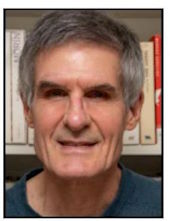© 2024 Alain Tremblay
© 2024 Urantia Association of Quebec

Francois Audet
Gatineau
Following a question from a member of our study group that I had impulsively, and I apologize, deemed inappropriate, I produced the short text below that I sent the day after our meeting by email to the members of our group. Subsequently, Gilles Bertrand suggested that this might interest other readers and was worth sharing in our Reflectivity. This text therefore has no claim to be exhaustive, however the experience was rich in lessons, which I may have the chance to clarify in the future.
Our group began studying Booklet 121 on the life of Jesus and we were told that “the basis for this account was provided by a secondary midwayer who was once charged with the superhuman supervision of the Apostle Andrew” (Introduction to Part IV).
Here is the text of the email, with slight corrections, sent on December 18, 2023:
First of all, I would like to offer Maurice my sincere apologies for the remark I made regarding the relevance of his question about the midway creatures accompanying or not the 11 apostles except Andrew. In the future, I will think twice before speaking! I promise! In fact, Maurice’s question is quite relevant, and in trying to answer it today, I made some discoveries (at least for me) that I share with you.

It would seem that there was a midwayer who accompanied each apostle, because the one who accompanied Andrew and who narrates booklet 121 thanks the eleven other midwayers of the commission (UB 121:8.13). The question that we can then ask ourselves is why was the midwayer attached to the apostle Andrew mandated? I believe that this is due to several factors: Andrew’s personality, his role among the apostles as well as the fact that his written narration, although lost, but to which the midwayer had access, is probably the most faithful of the life of Jesus.
On Andrew’s personality, we are told (UB 139:1.2) … “Coming from an excellent line of ancestors and was the ablest man of the twelve. Excepting oratory, he was the peer of his associates in almost every imaginable ability. Jesus never gave Andrew a nickname, a fraternal designation. But even as the apostles soon began to call Jesus Master, so they also designated Andrew by a term the equivalent of Chief.” In UB 139:1.8 it says: “Of all the apostles, it was Andrew who judged men best”. Two paragraphs later (UB 139:1.10): “Andrew was a man of clear insight, logical thought, and firm decision, whose great strength of character consisted in his superb stability.” In the same paragraph, we are told that he abhorred flattery and hypocrisy.
On his roll we can read that he was a good organizer and an even better administrator. He was part of the inner circle of four apostles and had been appointed by Jesus as head of the apostolic group (UB 139:1.3).
As for his account of the life of Jesus, we are told (UB 139:1.9): “Very soon after Jesus’ ascension on high, Andrew began the writing of a personal record of many of the sayings and doings of his departed Master. After Andrew’s death other copies of this private record were made and circulated freely among the early teachers of the Christian church. These informal notes of Andrew’s were subsequently edited, amended, altered, and added to until they made up a fairly consecutive narrative of the Master’s life on earth.” The four Gospels (see UB 121:8) are all later than 67 A.D. Mark’s in 68 A.D. is based on Peter’s recollections, and met a need of Paul for the Church of Rome. Matthew’s was written by his disciple Isadore in 71 A.D. from notes of his Master, which Matthew had written for the edification of the Christian Jews. That of Luke, dating from 90, is strongly influenced by Paul.
Considering Andrew’s character, the fact that his narration did not respond to a need to edify anyone, and that his memories, when recorded, were the freshest, leads one to believe that his narration of the life of Jesus is the most faithful. We are also told (UB 121:8.12) that in relating the life of Jesus the revelators were to give priority to purely human sources. This includes, in addition to Andrew’s memories (UB 121:8.13) “… thought gems and superior concepts of Jesus’ teachings assembled from more than two thousand human beings who have lived on earth from the days of Jesus…”!
This perhaps explains why it was the midwayer attached to the apostle Andrew who was designated to narrate the life of Jesus; although it is also written: “This group of papers was sponsored by a commission of twelve midwayers from Urantia acting under the supervision of a Melchizedek director of the revelation.” (Introduction to Part IV).

Wishing you Happy Holidays!
Fraternally!